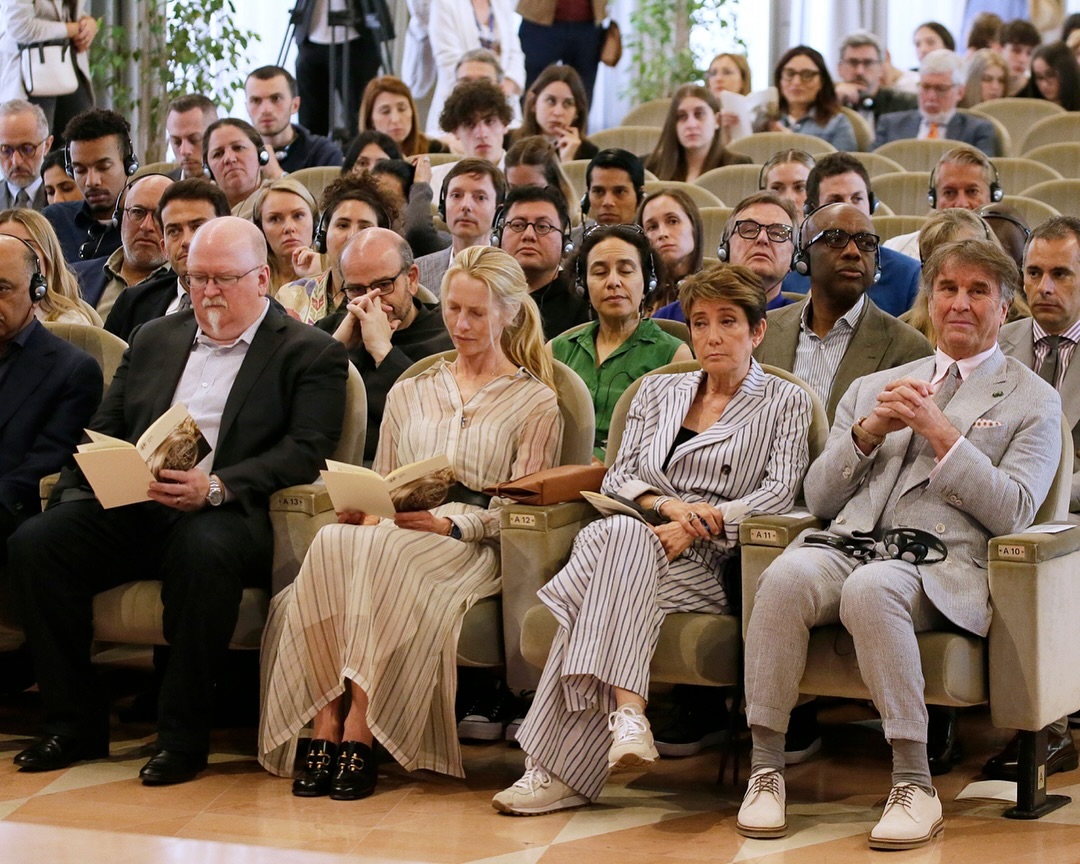At the “Second Symposium on Soul and Economics in Solomeo Italy,” the honorary degree awarded by the University of Perugia to Reid Hoffman the founder of LinkedIn: AI should not be feared
In an emotional and significant setting, Reid Hoffman, visionary entrepreneur and founder of LinkedIn, received an honorary doctorate in Humanities from the University of Perugia. The ceremony took part in the context of the “Symposium on Soul and Economics in Solomeo.” This event, promoted by Brunello Cucinelli, brought together some of the brightest minds from Silicon Valley and academia this month of May 2024 to discuss the ethical and human integration of artificial intelligence. The first happening of the Symposium was held back in 2019.
Six maxims to help elevate us, guide us in life and our choices, and empower the best part of us. I will find a way, or I will make one. We are symbols and we inhabit symbols. The projects of cathedrals ennoble our efforts and transform us into a human society. We are Homo Techne, technology is what makes us human. We must take small risks to then be able to face great risks. We have the obligation to make the future better than the present.
A three-day reflection on humanity and technology
Notable attendees included Lauren Powell Jobs, Steve Jobs’ widow and philanthropist, Nicholas Thompson, CEO of The Atlantic, James Manyika, SVP of Google Technology and Society, Fei Fei Li, scientist and head of the Human Centered Artificial Intelligence Institute at Stanford, Refik Anadol, world-renowned artist, Michael Evans, president of Alibaba, Arvind Krishna, CEO of IBM, Kevin Scott, CTO of Microsoft, and many other experts. A congregation of brilliant minds gathered in Solomeo for a symposium that addressed crucial themes about the past, present, and future of humanity.





“We are experiencing an incredible technological transformation,” said Hoffman. “We must shape this transformation and be shaped by it. We are Homo Techne, builders and users of tools. The fusion of humanity and technology does not create a cyborg but an improved human. We have the obligation to make the future better than the present.”

Hoffman’s Keynote Lecture
In his lecture, Hoffman touched on themes of beauty, inequality, and a New Universal Humanism. Citing authors like TS Eliot, Bacon, Goedel, Escher, Bach, and Emerson, and using frequent digressions in Latin, he argued that the fear of AI is unfounded. “Humanity has always been the synthesis of various dichotomies. Progress is made of small calculated risks,” he stated. “We should not fear AI but fear itself.”
Hoffman emphasized the importance of an ethical and responsible dialogue about AI, a point reiterated by the Magnificent Rector Maurizio Oliviero, who announced the establishment of a New Universal Humanism course at the University of Perugia, starting in September. This course will span various faculties of the university, promoting an interdisciplinary reflection on technology and humanity.

The importance of ethics in AI
Fra’ Paolo Benanti, theologian and Franciscan, advisor to Pope Francis on artificial intelligence and ethics, expressed great appreciation for Hoffman’s lecture. “It struck me deeply for its clarity and depth,” said Fra’ Benanti. “Reid’s New Universal Humanism reaffirms the primacy of man. And I am also here as a friend and admirer of Brunello Cucinelli, who always puts man at the center of his activities.”
A Personal Encounter with Brunello Cucinelli
I still remember my first meeting with Brunello Cucinelli in Florence at Pitti Immagine Uomo one early morning just after the Corona Virus madness. He was touring the empty pavilions alone, checking over brand booths. I was there solving a last-minute problem for a client, and he stopped, smiling at me. We had a short and nice conversation, and it felt so unreal, like a bubble in space-time, popping too soon and taking me back to material reality.
My opportunity for a direct stream of knowledge and presence comes from one dear friend living right there where things happen and that I will visit more and more often since we are already part of this beautiful story of making the first steps in humanizing technology.
In these interactions, I find the seeds of a future where technology serves humanity, where our digital advancements are infused with the wisdom and values of our shared human heritage. Meeting Cucinelli was not just an encounter with a person but a moment that encapsulated the very ethos of the symposium—a commitment to integrating the soul and technology in ways that uplift us all.
Conclusions and future perspectives
The symposium in Solomeo, which might have its next stop in New York or Shanghai in 2025-26, represented a moment of deep and shared reflection on the interaction between technology and humanity. Brunello Cucinelli summed up the essence of the event with an optimistic vision: “Whoever humanizes the Internet first will become the Leonardo of the new millennium.”
The central message is clear: artificial intelligence should not be feared. Instead, it should be seen as an opportunity to elevate humanity, preserving and enhancing the fundamental values that make us human. This is the challenge and promise of our time.
